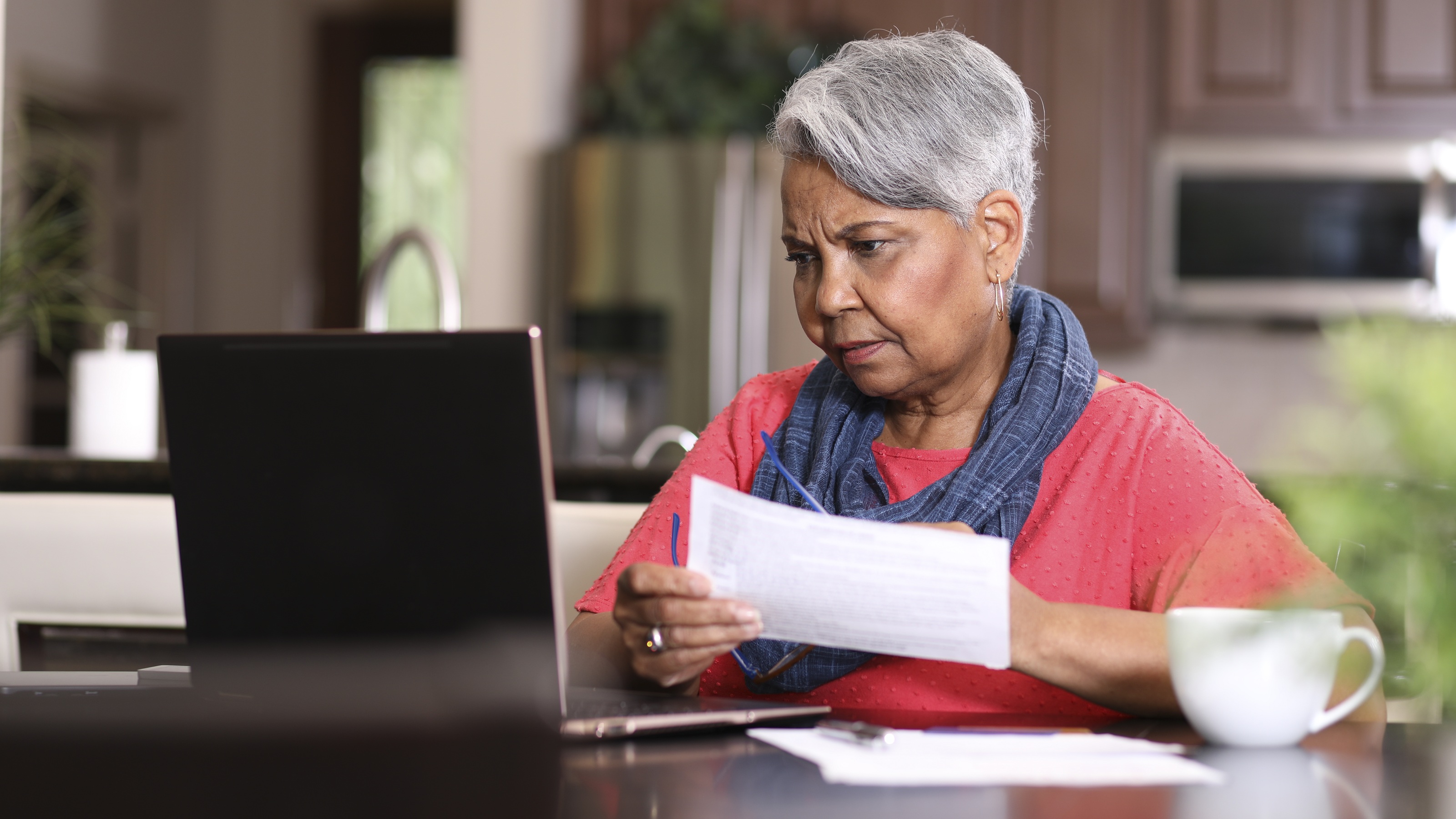Protect Your Nest Egg From a Volatile Market
As you approach retirement, you need to be more aware of sequence risk and adjust your portfolio accordingly.

Profit and prosper with the best of Kiplinger's advice on investing, taxes, retirement, personal finance and much more. Delivered daily. Enter your email in the box and click Sign Me Up.
You are now subscribed
Your newsletter sign-up was successful
Want to add more newsletters?

Delivered daily
Kiplinger Today
Profit and prosper with the best of Kiplinger's advice on investing, taxes, retirement, personal finance and much more delivered daily. Smart money moves start here.

Sent five days a week
Kiplinger A Step Ahead
Get practical help to make better financial decisions in your everyday life, from spending to savings on top deals.

Delivered daily
Kiplinger Closing Bell
Get today's biggest financial and investing headlines delivered to your inbox every day the U.S. stock market is open.

Sent twice a week
Kiplinger Adviser Intel
Financial pros across the country share best practices and fresh tactics to preserve and grow your wealth.

Delivered weekly
Kiplinger Tax Tips
Trim your federal and state tax bills with practical tax-planning and tax-cutting strategies.

Sent twice a week
Kiplinger Retirement Tips
Your twice-a-week guide to planning and enjoying a financially secure and richly rewarding retirement

Sent bimonthly.
Kiplinger Adviser Angle
Insights for advisers, wealth managers and other financial professionals.

Sent twice a week
Kiplinger Investing Weekly
Your twice-a-week roundup of promising stocks, funds, companies and industries you should consider, ones you should avoid, and why.

Sent weekly for six weeks
Kiplinger Invest for Retirement
Your step-by-step six-part series on how to invest for retirement, from devising a successful strategy to exactly which investments to choose.
The dream of a secure and relaxing retirement seems to grow more and more elusive with each passing year.
Part of the reason: The onus is on the individual more than ever to build a healthy retirement nest egg, often depending on the stock market to help fuel that growth.
And, as everyone knows, the stock market can be fickle. Today's gains can be wiped out by tomorrow's losses.
From just $107.88 $24.99 for Kiplinger Personal Finance
Become a smarter, better informed investor. Subscribe from just $107.88 $24.99, plus get up to 4 Special Issues

Sign up for Kiplinger’s Free Newsletters
Profit and prosper with the best of expert advice on investing, taxes, retirement, personal finance and more - straight to your e-mail.
Profit and prosper with the best of expert advice - straight to your e-mail.
Many people will recall that retirement once involved what could be thought of as a three-legged financial stool. Social Security and personal savings were two of those legs, and they remain, even if they appear wobbly at times. But for most people, the stool's third leg—a pension—has disappeared.
That puts even more pressure on making sure your savings is strong and, as you near retirement, protected from a volatile market that, on one bad day, could wash away decades of sacrifice on your part.
In short, the thing that can affect you most in retirement is an unlucky sequence of returns.
What does that mean? Simply this: When you're saving for retirement, the order of your gains and losses usually doesn't have a major impact because, over time, they tend to average out.
That changes once you begin making withdrawals from your retirement savings. Big losses in the first years of retirement can be especially devastating because your portfolio's value now is being hit by a double whammy—the market drop and you taking out money to live on.
That means, when the market turns around and you start experiencing plus years, you have a much more difficult time recovering because your balance dropped so low. And on top of that, you're still withdrawing money, making any overall market gain less valuable for you as an individual.
A huge loss early in retirement also means that the withdrawal amount you need to maintain your lifestyle begins to represent a higher percentage of your overall portfolio.
To show you what I mean, think of the rule-of-thumb that you should plan to withdraw 4% of your savings each year in retirement.
Here's how a volatile market can wreak havoc with that 4% rule. Hypothetically, let's say you retired at 66 with $1 million in savings and decided that withdrawing $40,000 (4%) each year would provide you what you needed to live on when coupled with Social Security.
So far, so good.
But it wasn't so good in 2008 when the market tumbled drastically, cutting some portfolios in half. Suddenly, the value of that $1 million retirement savings might have been $500,000 if it was all allocated in investments subject to stock market volatility, and a $40,000 withdrawal would be 8%, not 4%, or your portfolio.
It would take some extraordinarily great years in the market to recover from that, especially with you continuing to lower the principal each year with your withdrawals.
That's why as you near retirement you want to re-examine your investments to see how you can lower your portfolio's exposure to market volatility.
Portfolio planning involves more than investing in stocks, crossing your fingers and hoping it all works out. You want to make sure you are diversified beyond stocks and bonds. Other places you could allocate your assets could include real estate, commodities and annuities, but you'll want to speak with your financial adviser to determine what might work best for your individual situation.
Sure, the low-volatility approach means you'll miss out on any amazing years with 30% gains in the market.
Don't beat yourself up too much, though.
You'll also dodge those years when the market crashes, leaving you with no good way to recover.
Kim MacCormack contributed to this article.
GFPC is not responsible for the views and opinions contained herein, and makes no representations or warranties about the accuracy, reliability, completeness or timeliness of the content, and does not recommend or endorse any specific information herein.
Profit and prosper with the best of Kiplinger's advice on investing, taxes, retirement, personal finance and much more. Delivered daily. Enter your email in the box and click Sign Me Up.

Jared Elson is a Series 65 Licensed Investment Adviser Representative (IAR) and the CEO of Authentikos Advisory. Following a 10-year career with Yahoo, Jared identified an acute need for sound financial counsel in the tech industry and has excelled in giving tech professionals the tools they need to grow and preserve their wealth.
-
 Here’s How to Stream the Super Bowl for Less
Here’s How to Stream the Super Bowl for LessWe'll show you the least expensive ways to stream football's biggest event.
-
 The Cost of Leaving Your Money in a Low-Rate Account
The Cost of Leaving Your Money in a Low-Rate AccountWhy parking your cash in low-yield accounts could be costing you, and smarter alternatives that preserve liquidity while boosting returns.
-
 I want to sell our beach house to retire now, but my wife wants to keep it.
I want to sell our beach house to retire now, but my wife wants to keep it.I want to sell the $610K vacation home and retire now, but my wife envisions a beach retirement in 8 years. We asked financial advisers to weigh in.
-
 How to Add a Pet Trust to Your Estate Plan: Don't Leave Your Best Friend to Chance
How to Add a Pet Trust to Your Estate Plan: Don't Leave Your Best Friend to ChanceAdding a pet trust to your estate plan can ensure your pets are properly looked after when you're no longer able to care for them. This is how to go about it.
-
 Want to Avoid Leaving Chaos in Your Wake? Don't Leave Behind an Outdated Estate Plan
Want to Avoid Leaving Chaos in Your Wake? Don't Leave Behind an Outdated Estate PlanAn outdated or incomplete estate plan could cause confusion for those handling your affairs at a difficult time. This guide highlights what to update and when.
-
 I'm a Financial Adviser: This Is Why I Became an Advocate for Fee-Only Financial Advice
I'm a Financial Adviser: This Is Why I Became an Advocate for Fee-Only Financial AdviceCan financial advisers who earn commissions on product sales give clients the best advice? For one professional, changing track was the clear choice.
-
 65 or Older? Cut Your Tax Bill Before the Clock Runs Out
65 or Older? Cut Your Tax Bill Before the Clock Runs OutThanks to the OBBBA, you may be able to trim your tax bill by as much as $14,000. But you'll need to act soon, as not all of the provisions are permanent.
-
 I'm a Financial Adviser: This Is the $300,000 Social Security Decision Many People Get Wrong
I'm a Financial Adviser: This Is the $300,000 Social Security Decision Many People Get WrongDeciding when to claim Social Security is a complex, high-stakes decision that shouldn't be based on fear or simple break-even math.
-
 4 Ways Washington Could Put Your Retirement at Risk (and How to Prepare)
4 Ways Washington Could Put Your Retirement at Risk (and How to Prepare)Legislative changes, such as shifting tax brackets or altering retirement account rules, could affect your nest egg, so it'd be prudent to prepare. Here's how.
-
 Is Your Retirement Plan Built for 2026 — or Stuck in 2006?
Is Your Retirement Plan Built for 2026 — or Stuck in 2006?It's time to move away from the 4% rule and the 60/40 portfolio to an adaptable, tax-diversified strategy focused on reliable income and longevity.
-
 Filed for Social Security Too Soon? 2 Ways to Get a Do-Over
Filed for Social Security Too Soon? 2 Ways to Get a Do-OverIf you've claimed Social Security too soon, two SSA rules allow a do-over. But be warned: Using them clumsily can lead to surprise repayments or lost benefits.